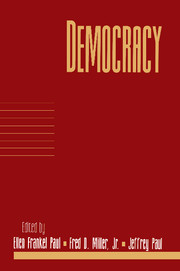Book contents
- Frontmatter
- Contents
- Introduction
- Acknowledgments
- Contributors
- The Very Idea of Popular Sovereignty: “We the People” Reconsidered
- Quasi-Rights: Participatory Citizenship and Negative Liberties in Democratic Athens
- Is There a Duty to Vote?
- Postmodern Liberalism and the Expressive Function of Law
- Democratic Epistemology and Accountability
- Political Quality
- Why Deliberative Democracy Is Different
- The Institutions of Deliberative Democracy
- Democracy as a Telos
- Radical Democracy, Personal Freedom, and the Transformative Potential of Politics
- Democracy and Value Pluralism
- The Problem of Russian Democracy: Can Russia Rise Again?
- Index
Is There a Duty to Vote?
Published online by Cambridge University Press: 03 May 2010
- Frontmatter
- Contents
- Introduction
- Acknowledgments
- Contributors
- The Very Idea of Popular Sovereignty: “We the People” Reconsidered
- Quasi-Rights: Participatory Citizenship and Negative Liberties in Democratic Athens
- Is There a Duty to Vote?
- Postmodern Liberalism and the Expressive Function of Law
- Democratic Epistemology and Accountability
- Political Quality
- Why Deliberative Democracy Is Different
- The Institutions of Deliberative Democracy
- Democracy as a Telos
- Radical Democracy, Personal Freedom, and the Transformative Potential of Politics
- Democracy and Value Pluralism
- The Problem of Russian Democracy: Can Russia Rise Again?
- Index
Summary
INTRODUCTION
The genre of public service advertisements that appear with two- and four-year cyclical regularity is familiar. Cameras pan across scenes of marines hoisting the flag on Iwo Jima, a bald eagle soaring in splendid flight, rows of grave markers at Arlington. The somber-voiced announcer remonstrates: “They did their part; now you do yours.” Once again it is the season to fulfill one's civic duty, to vote.
Good citizenship in the final decade of the twentieth century does not seem to require much of the individual beyond simple law-abidingness. We have traveled a far distance from the Athenian agora. However, there exists a remarkable degree of consensus that voting is requisite, that one who fails to exercise the franchise is thereby derelict. Candidates for the nation's highest office publicly proclaim that duty; so do one's neighbors and associates–perhaps with some asperity in their voices–when informed that you chose to absent yourself from the polls that they took the trouble to visit. We call that consensus remarkable because, as will become evident, it is exceedingly difficult to develop a persuasive rationale for the existence of a duty to vote. Often that duty is simply taken for granted. Where arguments are given, they typically invoke either fallacious reasoning or dubious empirical premises. A cautious surmise is that the assurance with which the duty to vote is affirmed is not matched by equivalent cogency of justification.
- Type
- Chapter
- Information
- Democracy , pp. 62 - 86Publisher: Cambridge University PressPrint publication year: 2000
- 2
- Cited by

